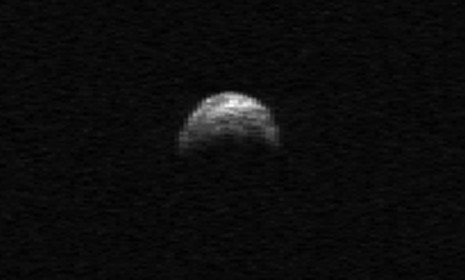The giant asteroid that's zipping unnervingly close to Earth
A space rock the size of an aircraft carrier will zoom by our planet on Tuesday — our closest brush with astronomical catastrophe in decades

A free daily email with the biggest news stories of the day – and the best features from TheWeek.com
You are now subscribed
Your newsletter sign-up was successful
At about 6:30 p.m. EST next Tuesday, a large asteroid traveling more than 30,000 miles per hour will streak quite close to Earth — marking the nearest fly-by of any such asteroid in 35 years. But don't worry — it's not going to hit us. Four key questions:
How big is it?
At its widest point, the spherical object, named 2005 YU55, is 1,300 feet across. That's a bit longer than four football fields, or about the length of an aircraft carrier. It will speed by us at a rate of nearly 9 miles per second.
The Week
Escape your echo chamber. Get the facts behind the news, plus analysis from multiple perspectives.

Sign up for The Week's Free Newsletters
From our morning news briefing to a weekly Good News Newsletter, get the best of The Week delivered directly to your inbox.
From our morning news briefing to a weekly Good News Newsletter, get the best of The Week delivered directly to your inbox.
How close is it coming?
The asteroid will come within roughly 200,000 miles of Earth — or about 85 percent of the distance between the Earth and the moon. The asteroid's flight marks its "closest encounter with Earth in at least the last 200 years," says Eyder Peralta at NPR. Another asteroid this big won't fly by again until at least 2028.
So nothing to worry about, right?
"Everybody can relax," says Mike Wall at Space.com. "The space rock is not going to slam into Earth." The relatively close approach should be looked at as a good thing, as it will allow scientists to study the asteroid and "predict the space rock's orbit even further into the future."
A free daily email with the biggest news stories of the day – and the best features from TheWeek.com
But what if it did smash into us?
Such an impact would release a 71 mph blast of air strong enough to shatter windows 60 miles from the point of impact, while triggering a 7.1-magnitude earthquake that would create rippling tsunami waves up to 70 feet high. "But again, just to be clear, the asteroid ain't gonna hit us," says Dan Vergano at USA Today.
Sources: NPR, Scientific American, Space.com, USA Today
-
 What is the endgame in the DHS shutdown?
What is the endgame in the DHS shutdown?Today’s Big Question Democrats want to rein in ICE’s immigration crackdown
-
 ‘Poor time management isn’t just an inconvenience’
‘Poor time management isn’t just an inconvenience’Instant Opinion Opinion, comment and editorials of the day
-
 Bad Bunny’s Super Bowl: A win for unity
Bad Bunny’s Super Bowl: A win for unityFeature The global superstar's halftime show was a celebration for everyone to enjoy